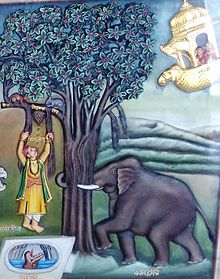
| Part of a series on |
| Jainism |
|---|
 |
| Philosophy |
EthicsEthics of Jainism
|
| Jain prayers |
| Major figures |
| Major sectsSchools and Branches |
| Jain literature |
| Festivals |
| PilgrimagesTirth |
| Other |
Saṃsāra (transmigration)(Sanskrit: संसार, IAST: saṃsāra) in Jain philosophy, refers to the worldly life characterized by continuous rebirths and reincarnations in various realms of existence. Saṃsāra is described as mundane existence, a life full of suffering and misery, and hence it is considered undesirable and worth renunciation. The Saṃsāra is without any beginning, and the soul finds itself in bondage with its karma since the beginning-less time. Moksha is the only way to be liberated from saṃsāra.
Influx of karmas (asrava)
According to the Jain text Tattvartha Sutra:
(There are two kinds of influx, namely) that of persons with passions, which extends transmigration, and that of persons free from passions, which prevents or shortens it.
— Tattvārthsūtra (6-4-81)
Activities that lead to the influx of karmas (asrava) which extends transmigration are:
- Five senses
- Four passions (kasāya)
- Anger
- Ego
- Deceit
- Greed
- The non-observance of the five vows
- Non-observance of the twenty-five activities like Righteousness
- Saṃsāra bhavanā
Jain texts prescribe meditation on twelve forms of reflection (bhāvanā) for those who wish to stop the above described asrava. One such reflection is Saṃsāra bhavanā.
It has been described in one of the Jain text, Sarvārthasiddhi as:
Transmigration is the attainment of another birth by the self owing to the ripening of karmas. The five kinds of whirling round have been described already. He, who wanders in the endless cycle of births and deaths, undergoing millions of afflictions in innumerable wombs and families, takes different relationships such as father, brother, son, grandson, etc, or mother, sister, wife, daughter and so on, being propelled by the mechanism of karmas. The master becomes servant and the servant master, just as an actor acts several parts on the stage. To be brief, sometimes one becomes one’s own son. There is no end to the transformations undergone by the self owing to the influence of karmas. Thus to reflect on the nature of mundane existence is contemplation on worldly existence. He who contemplates thus is alarmed at the miseries of transmigration and becomes disgusted with worldly existence. And he who is disgusted with it endeavours to free himself from it.
Champat Rai Jain, a 20th-century Jain writer, in his book The Practical Dharma, wrote:
Endless is the cycle of transmigration; painful is every form of life; there is no happiness in any of the four conditions of existence; devas, human beings, animals and residents of hells are all involved in pain and misery of some kind or other; moksha alone is blissful and free from pain; the wise should, therefore, only aspire for moksha; all other conditions are temporary and painful."
See also
Notes
- Vijay K. Jain 2011, p. 81.
- Vijay K. Jain 2011, p. 81-82.
- ^ Champat Rai Jain 1917, p. 52.
- S.A. Jain 1992, p. 246.
References
- Jain, Vijay K. (2011), Acharya Umasvami's Tattvarthsutra (1st ed.), Uttarakhand: Vikalp Printers, ISBN 978-81-903639-2-1,
 This article incorporates text from this source, which is in the public domain.
This article incorporates text from this source, which is in the public domain. - Jain, Prof. S.A. (1992) , Reality (English Translation of Srimat Pujyapadacharya's Sarvarthasiddhi) (Second ed.), Jwalamalini Trust,
 This article incorporates text from this source, which is in the public domain.
This article incorporates text from this source, which is in the public domain. - Jaini, Padmanabh S. (1998) , The Jaina Path of Purification, Delhi: Motilal Banarsidass, ISBN 81-208-1578-5
- Champat Rai Jain (1917), The Practical Path, The Central Jaina Publishing House
| Gods | |||||
|---|---|---|---|---|---|
| Philosophy | |||||
| Branches |
| ||||
| Practices | |||||
| Literature | |||||
| Symbols | |||||
| Ascetics | |||||
| Scholars | |||||
| Community | |||||
| Jainism in |
| ||||
| Jainism and | |||||
| Dynasties and empires | |||||
| Related | |||||
| Lists | |||||
| Navboxes | |||||
This Jainism-related article is a stub. You can help Misplaced Pages by expanding it. |